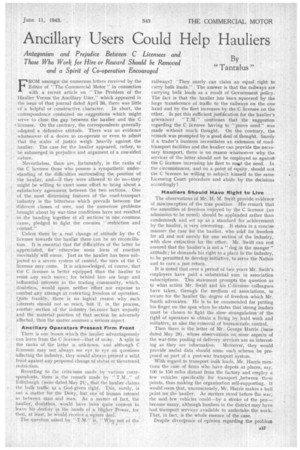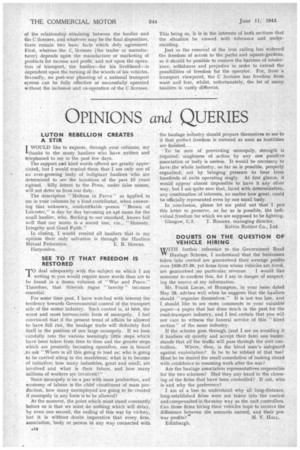Ancillary Users Could Help Hauliers
Page 19

Page 20

If you've noticed an error in this article please click here to report it so we can fix it.
Antagonism and Prejudice Between C Licensees and Those Who Work for Hire or Reward Should be Removed and a Spirit of Co-operation Encouraged
By.
" Tantalus "
FROM amongst the numerous letters received by the Editor of " The Commercial Motor "' in connection with a recent article on " The Problem of the Haulier Versus the Ancillary User," which appeared in the issue of that journal dated April 30, there was little of a helpful or constructive character. In short, the correspondence contained no .suggestions which might serve to close the gap between the haulier and the C 1 licensee. On the contrary, the correspondents generally adopted a defensive attitude. There was no evidence whatsoever of a desire to co-operate or even to admit that the scales of justice weigh heavily against the haulier. The case for the haulier appeared, rather, to be submerged in prejudice and argument of a one-sided nature.
Nevertheless, there are, fortunately, in the ranks of the C licensee those who possess a sympathetic understanding of the difficulties surrounding the position of the haulier, and—if they were allowed to do so—they • might be willing to exert some effort to bring about a satisfactory agreement between the two sections. One of the most distressing features of the road-transport industry is the bitterness which prevails between the different classes of user, and the numerous problems brought about by war-time conditions have not resulted in the banding together of all sections' in one common cause, pledged to fight the enemies " restriction and control."
Unless there be a real change of attitude by the C licensee towards the haulier there can be no reconciliation. It is essential that the difficulties of the latter be appreciated, for otherwise some form of reaction inevitably' will ensue. Just as the haulier has been subjected to a severe system of control, the turn of the C licensee may come. It is acknowledged, of course, that the C licensee is better equipped than the haulier to resist any such move : for behind him are large and influential interests in the trading community, 'which, . doubtless, would Spare neither effort nor expense to combat any attempt at restricting freedom of operation. Quite frankly, there is no logical reason why such interests should not so react, but if, in the process, another section of the industry becomes hurt unjustly and the materialpoaition of that section be adversely affected, then the matter assumes a serious aspect.
Ancillary Operators Present Firm Front
There is one lesson wheal the haulier advantageously can learn from the C licensee—that of unity. A split in the ranks of the latter is unknown, and although C licensees may not always see eye to eye on questions affecting the industry, they would always present a solid front against any proposed change of status or threatened '
restriction. .
Reverting to the criticisms made by various correspondents, there is. the remark made by " T.M.," of EdinbUrgh (issue dated May 21), ,that the haulier claims. the the bulk traffic as a God-given right. This, surely, is not a matter for the Deity; but one of human interest as between man and man. As a matter of fact, the haulier; doubtless, would have been quite content to leave his destiny in the hands of a Higher Power; for Then, at least, he would receive a square deal.
The question asked by T.M." is, " Why not of the railways? ' They surely can claim an equal right to carry bulk loads." The answer is that the railways are carrying bulk loads as a result of Government policy. The fact is that the haulier has been squeezed by the large transference of traffic to the railways on the one hand and by the fleet increases by the C licensee on the Other. Is not this sufficient justification for the haulier's grievance? " T.M." continues that the suggestion regarding the C licensee having to " prove need" was made without much thought. On the contrary, the remark was prompted by a good deal of thought. Surely if a trader's business necessitates an extension of roadtransport facilities and the haulier can provide the necessary transport, there is no reason whatsoever why the services of the latter should not be employed as against the C licensee increasing his fleet to moat the need. In the circumstances, and on a point of equity, should not the C licensee be willing to subject himself to the same Licensing Court procedure and abide by the decisions accordingly?
Hauliers Should Have Right to Live
The observations of Mr. H. M. Swift provide evidence of misconception of the true position. His remark that the amenities of .freedom enjoyed by the C licensee (an admission to be noted) should be applauded rather than condemned and set up as a standard for achievement by the haulier, is very interesting. It states in a concise manner the case for the haulier, who ask for freedom for all and not merely for one section of the industry, with slow extinction for the other. Mr. Swift can rest assured that the haulier's is not a "dog in the manger" attitude; he demands his right to a place in the industry, to be permitted to develop initiative, to serve the Nation and to earn a just return.
It is noted that over a period of two years Mr. Swift's employers have paid a substantial sum in association subscriptions. This statement prompts the question as to what action Mr. Swift and his C-licensee colleagues have taken, through the medium of associations, to secure for the haulier the degree of freedom which Mr.
Smith advocates. He is to be commended for putting his finger on the spot when he states that strong leaders must be chosen to fight the slowstrangulation of the right of operators to obtain a living by hard work and initiative, as also the removal of bureaucratic. control.
Then there is the letter of Mr. George Harris (issue dated May 28), whose observations on some aspects of
the war-time pooling of delivery services are as interesting as they are informative. Moreover, they would provide useful data should some such scheme be proposed as part of a post-war transport system.
With regard to transport bulk loads, Mr. Harris mentions the case of firms who have depots at places, say, 100 to 130 miles distant from the factory and employ a few vehicles specifically for transport „between these points, thus making the organization self-supporting. It
would seem that, unconsciously, Mr. Harris makes a bull point for the haulier. As matters stood before tle war, the said few vehicles could.--by a stroke of the pen— become many, although hauliers in the district may have had transport services available to undertake the work. That, in fact, is the whole essence of the case.
Despite divergence of opinion regarding the problem of the relationship obtaining between the haulier and the C licensee, and whatever may be the final disposition, there remain two basic facts which defy agreement. First, whereas the C. licensee. (the trader or manufacturer) depends upon the manufacture or marketing of products for income and profit, and not upon the operation of transport, the haulier—for his livelihood----is dependent upon the turning of the wheels of his vehicles, Secondly, no post-war planning of a national transport system can be fully effective or succesafully operated without the inclusion and co-operation of the C licensee.
This being so, it is in the interests of both sections that the situation be viewed with tolerance and understanding. •
Just as the removal of the iron railing has widened the freedom of access to the parks and square-gardens, so it should be possible to remove the barriers of intolerance, selfishness and prejudice in order to extend the possibilities of freedom for the operator. For, from a transport viewpoint, the C licensee has freedom from want and fear, whilst, unfortunately, the lot of many hauliers is vastly different.




















































